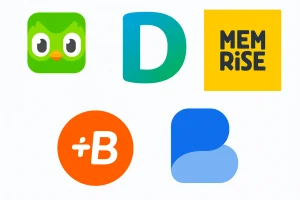Learning a new language can be an exciting and rewarding experience, but there are many misconceptions and myths about learning foreign languages and the language learning process.
From the belief that it’s all about innate talent, or that language apps alone will make you fluent, these myths can be misleading and discouraging for language learners.
In this post, we’ll explore some of the most common myths about language learning and provide insights into the truth behind them.
Talent & aptitude
Myth: You have to be “talented” to learn a language.
Truth: Many people believe that some people are just naturally good at language learning, while others are not. However, language learning is a skill that almost anyone can develop with enough practice and effort, regardless of innate ability.
Keep in mind that there are approximately 3.3 billion bilingual speakers in the world, you are at least as talented as they are!
The sooner the better
Myth: Children learn languages better than adults.
Truth: Children do have an advantage when it comes to language learning, as their brains are more flexible and receptive to new information.
However, adults have other advantages, such as more developed cognitive abilities (including the ability to learn and knowledge of their native language) and better memory, which can make them more efficient learners. It’s never too late to learn!
The app’ll do it for me
Myth: The app will teach me everything I need to know!
Truth: Despite what any app may claim, using an app alone will not make you be able to magically speak another language. While language learning apps can be a helpful tool for learning vocabulary and practicing grammar, they are not a substitute for real-life language practice and interactive experiences.
Apps may help you build a foundation of knowledge, but to truly become proficient in a language, you’ll need to engage in activities, such as communicating with other speakers of the language.
But the subtitles…!
Myth: “Watching Netflix in my target language is the same as studying!”
Truth: While watching movies and TV shows in the target language can be a useful way to immerse yourself in the language and pick up new vocabulary, relying solely on subtitles or dubbed versions is not the most effective method for language learning.
In short, your foreign language TV experiences need to be supported with focused and attentive learning periods to fully develop your language skills.
Fluency is key
Myth: You have to be fluent to have a conversation.
Truth: One common myth about language learning is that you need to become fluent before you can use the language. However, this view of fluency can be unrealistic and discouraging for learners, especially in the early stages of learning a language.
Fluency is a long-term goal, but it’s not necessary to have a conversation in a foreign language. Though fluency is of course desirable, just a basic understanding of vocabulary and grammar can be enough to start communicating and building confidence in a new language.
Conclusion
In conclusion, language learning is a complex and nuanced process that requires dedication and patience. By debunking common myths and misconceptions, you can approach the learning process with a more realistic and effective mindset. And by celebrating progress and focusing on achievable goals, you can build confidence and motivation to continue learning.
Remember, with the right approach and attitude, anyone can learn a new language!




